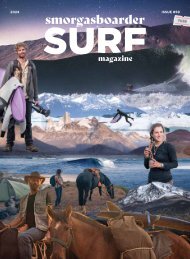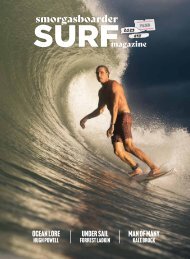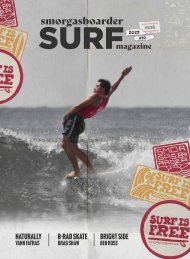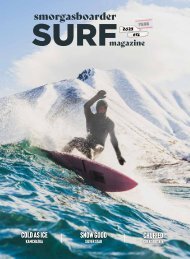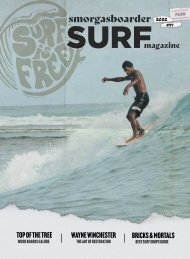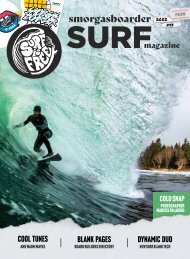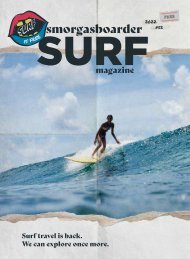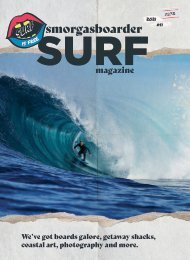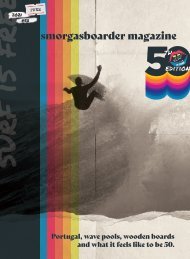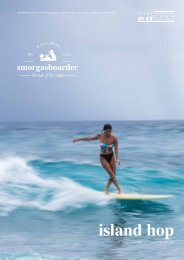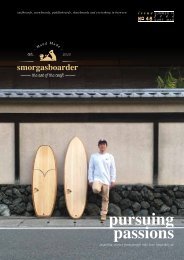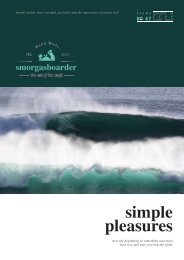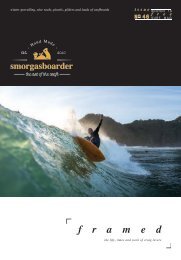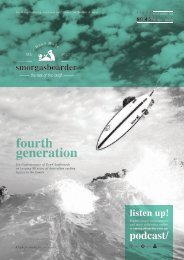SB_issue55_Digital
Create successful ePaper yourself
Turn your PDF publications into a flip-book with our unique Google optimized e-Paper software.
One of<br />
the greats<br />
As one of Australia’s iconic Brookvale Six, Keyo<br />
is steeped in Australian surf history and has<br />
always acted as the common thread between the<br />
surf, the craft and the community.<br />
You don’t end up as one of the founders of the<br />
modern Australian surf industry without being one<br />
of its pioneering brands and a major player in the<br />
shortboard revolution.<br />
For surf brand Keyo, it all started in the Northern<br />
Beaches of Sydney with the legendary Denny Keogh<br />
and his openness to innovate. In 1957, a young Denny<br />
started shaping surfboards from a garage, and in<br />
1959 officially opened the Keyo Surfboard factory and<br />
retail store in Brookvale, which would soon become<br />
Australia’s surfboard manufacturing centre.<br />
The first surfboard shaper that was brought in to<br />
help out Denny was none other than Midget Farrelly,<br />
winner of the 1963 Makaha international. In fact,<br />
Denny even shaped the board that Midget rode to<br />
victory in the first World Surfing Championships held<br />
at Manly Beach in 1964.<br />
Bob McTavish also joined Keyo in 1967 where he<br />
shaped his Vee bottoms and wide-backed nine<br />
footers, which in part kicked off the shortboard<br />
revolution. Bob even designed the ‘Keyo Plastic<br />
Machine’ vee bottom models that ended up selling at<br />
the astonishing rate of 70 per week.<br />
During the early days, other high-profile shapers and<br />
surfing royalty that worked with Keyo consisted of<br />
Kevin Platt, Neil Purchase, Geoff McCoy, Col Smith,<br />
Phil Cooper and Mickey Mac. In 1968 Nat<br />
Young also came on board and produced<br />
another popular model, the Tracker.<br />
Later that year, sadly the Keyo factory<br />
burnt to the ground but was quickly<br />
re-opened in the premises right behind<br />
the gutted factory.<br />
In 1972, things were fast-changing, and<br />
Denny acquired the Hobie Cat franchise<br />
to begin building catamarans. This meant<br />
that, by 1974, the production of Keyo<br />
surfboards stopped, giving way to the high<br />
demand of the popular Hobie Cat.<br />
Fast-forward to the mid 90's and a young<br />
Johnny Gill married Denny's daughter,<br />
Vanessa, and continued the legacy of<br />
producing Keyo boards. The iconic name<br />
in surfboard manufacturing has thrived<br />
through many long and competitive<br />
years in the surf industry by consistently<br />
embracing production technology, designing<br />
with ingenuity and perfecting quality through<br />
craftsmanship. To this day, the brand is still family<br />
run and owned by Johnny and Vanessa.<br />
Now based in Kincumber on the Central Coast of<br />
New South Wales, Keyo creates all kinds of stylish<br />
surfing craft and cloth on an international scale,<br />
complete with beachy tints and down-to-earth styles.<br />
As one of the greats, you can really tell when you<br />
pick up a Keyo board that it has been passed down<br />
through many talented hands and perfected over the<br />
course of Australia’s rich surfing history.<br />
keyointernational.com<br />
23 / #55 / sb



